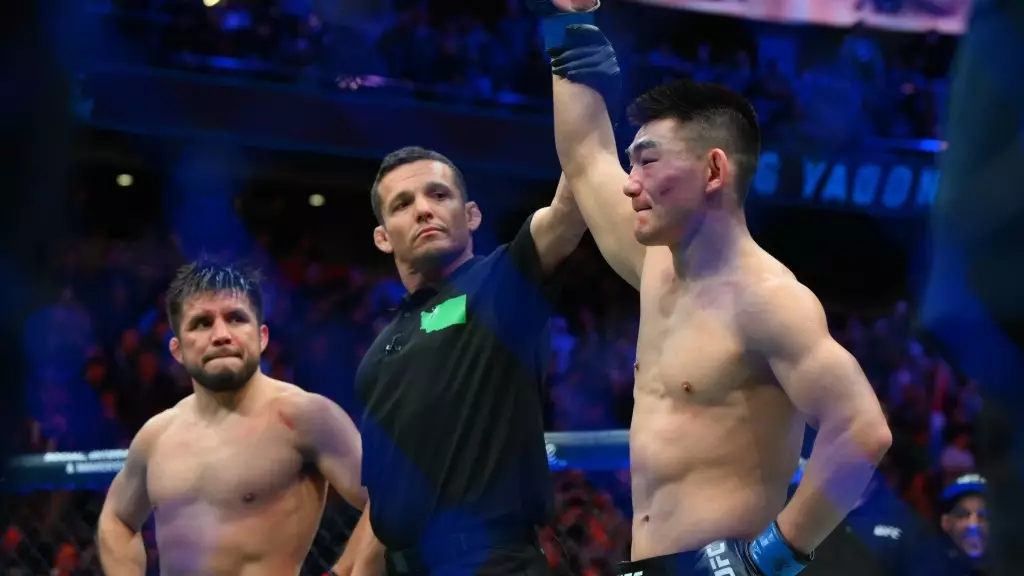In the high-stakes world of mixed martial arts, where every move can determine the livelihoods of fighters, officiating plays a pivotal role in the fairness and integrity of competitions. The recent clash between Henry Cejudo and Song Yadong at UFC Fight Night 252 has shone a glaring spotlight on the consequences of officiating decisions, particularly in the aftermath of an eye poke that left Cejudo questioning the integrity of the fight’s outcome.
Cejudo, a former double champ, faced a formidable opponent in Yadong, a rising star in the UFC. However, Cejudo’s promising night would take a drastic turn late in Round 3 when he suffered an inadvertent eye poke. In the chaotic arena, decisions must be made quickly, but in this case, one crucial choice left a stain on the fight’s integrity. After taking a five-minute recovery period, Cejudo returned to the octagon only to realize that his vision had not fully returned. This dilemma led the fight to the judges, resulting in a technical decision against the decorated fighter.
It’s clear that such developments are not just part of the sport; they can redefine a fighter’s career trajectory. The stakes were higher than mere statistics; they represented Cejudo’s hard work, reputation, and, ultimately, his legacy.
Upon reflecting on the fight, Cejudo expressed intense frustration, not merely with the result, but with referee Jason Herzog’s handling of the situation. In a candid FaceTime call disclosed through his YouTube channel, he articulated his grievances. Cejudo pointed out that Herzog’s failure to enforce existing rules, specifically regarding point deductions for fouls like eye pokes, greatly affected the bout’s outcome. “You didn’t take a point,” he stressed, highlighting that such enforcement is essential for maintaining fairness in competition.
Cejudo’s argument centers around a crucial point in boxing and mixed martial arts: the responsibility of referees to protect fighters not just from each other but also from themselves when they are incapable of competing effectively. Cejudo’s raw honesty reflects a deeper concern about how officiating decisions can create lasting impacts on the fighters involved.
In an unexpected twist, Herzog later conceded that he might have erred in not deducting a point for the eye poke. “I agree,” he stated in a follow-up discussion. This admission highlights the human element in officiating—a reminder that referees, just like fighters, are susceptible to the pressures of the moment. The referee acknowledged that the lack of a warning to Yadong or action taken at the time of the incident indeed warrants criticism. However, Herzog also presented a nuanced explanation for his decisions, revealing a depth of analysis that often escapes immediate assessments.
With the heat of battle still fresh, Herzog’s rationale was centered on Cejudo’s capacity to continue fighting. While he attempted to provide Cejudo the best opportunity to compete, hindsight paints a different picture, emphasizing the delicate balance referees must maintain between protecting fighters and allowing the competition to proceed.
This controversial bout serves as a microcosm for a larger discussion surrounding the officiating of mixed martial arts. The questions posed by Cejudo are relevant to not only this incident but to the sport as a whole. Fans and fighters alike seek clarity in the rules and their enforcement. As Cejudo noted, the integrity of the sport demands a rigorous application of rules, particularly those designed to protect fighters from unnecessary harm.
The debate extends beyond this particular incident. It ignites broader conversations about training and standards for referees within the sport. How can officials prepare themselves adequately to make instantaneous decisions in a constantly evolving and unpredictable environment? Should harsher penalties be applied for infractions like eye pokes to deter careless actions?
As Cejudo continues to process the loss, the world of mixed martial arts is left to contemplate the implications of this fight on the future of officiating. It’s a call to action for regulatory bodies to address the concerns of fighters and fans with urgency and transparency. Through open dialogues, accountability, and standardization, the reputation of MMA and the well-being of its participants can thrive in a way that reflects the sport’s true spirit of competition. While Cejudo’s experience may have ended with controversy, it also holds valuable lessons that, if applied judiciously, can enhance the integrity of mixed martial arts for generations to come.

